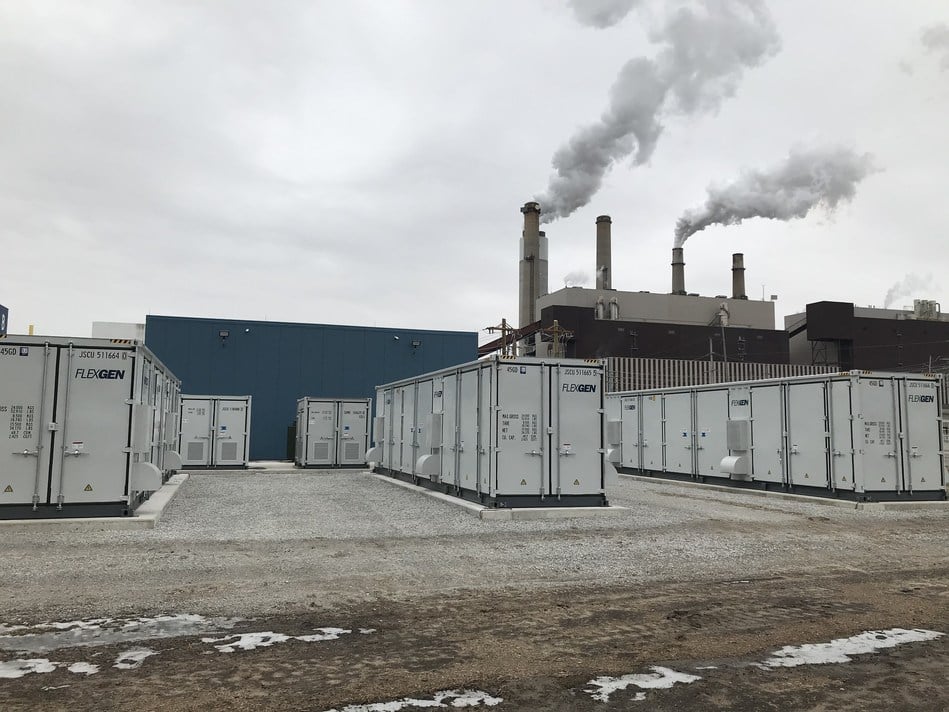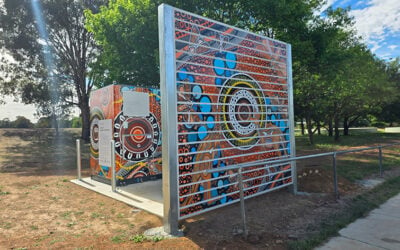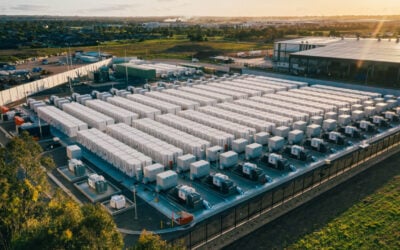
When turbines at a natural gas power plant in California go offline, battery energy storage will be used as a ‘much cleaner alternative’ to diesel or other fossil fuels in getting them up and running again.
Siemens Energy has been awarded an engineering, procurement and construction (EPC) contract to deploy large batteries at Marsh Landing Generating Station owned by US infrastructure investor Clearway. The 800MW power station runs on four Siemens simple-cycle gas turbine units and in the event of a power outage or blackout on the grid, battery storage will be connected to two of the units to get them back online as quickly as possible.
Emergency backup systems for such facilities usually run on diesel generators, or smaller fossil fuel-powered turbines.It’s Siemens’ first black start project for power generation in the US and a company representative told Energy-Storage.news that it will be fitted with 7MW / 5.48MWh of battery storage. The representative said that since the batteries are not connected to the grid to provide power, they are sized accordingly, with much shorter duration than many of California’s much larger grid-scale energy storage projects.
“Battery black start solutions are a much cleaner alternative to traditional diesel or other fossil fueled starting systems. Batteries produce zero carbon emissions during operation, while providing faster starting or response times. Batteries can also be recharged during off peak times to minimize operating cost.” the representative said.
Try Premium for just $1
- Full premium access for the first month at only $1
- Converts to an annual rate after 30 days unless cancelled
- Cancel anytime during the trial period
Premium Benefits
- Expert industry analysis and interviews
- Digital access to PV Tech Power journal
- Exclusive event discounts
Or get the full Premium subscription right away
Or continue reading this article for free
The project is already underway, with work having started about six months ago and it is expected to be complete by early summer 2021. The battery storage system will be able to support up to three attempts to restart the two Marsh Landing gas turbine units within one hour. It will add a “critical reliability service” to electricity supply in California’s Bay Area while improving grid stability, Siemens Energy claimed, allowing the generation units to start up without an external supply.
There have been a handful of such projects in various territories around the world. The world’s first instance of black starting large-scale natural gas generation using battery storage was claimed by two different projects, one in California by GE for California municipal utility Imperial Irrigation District announced in 2017 and the other a 5MW / 5MWh system in Germany by energy storage pioneer company Younicos (now part of mobile systems solutions company Aggreko) for utility WEMAG, announced more than a year prior to that.
More recently, in mid-2020 another US system integrator, FlexGen, deployed 12MW / 5.4MWh short-duration lithium-ion batteries that the company said successfully gave a black start to one of two turbines at a 77MW natural gas plant, including a 112MVA generation set-up transformer (GSU) for a utility in Indiana, replacing the role of diesel generators.
Fluence confirmed as battery system provider to project
The role of batteries as black start may not yet become a mainstream application, due to the relatively high capital cost of batteries versus diesel, although battery systems have the advantage of requiring no fuel and very little maintenance.
“At this time it really depends on regional mandates and requirements,” the Siemens Energy representative said when asked of the likelihood of this type of solution becoming an industry standard for reducing emissions and improving efficiency at power plants.
“Some states are limiting permits for fossil-based starting systems or mandating that batteries be utilised. Others are not quite as stringent. Battery starting systems still require a high initial investment, so it is hard to speculate on it becoming an industry standard,” the representative said.
Fluence, the energy storage system integrator and battery technology provider part-owned by Siemens Energy’s parent group Siemens, will provide the battery storage solution for the California Marsh Landing project.
Fluence’s market director for the EMEA region, Dr Holger Wolfschmidt, told Energy-Storage.news that “the focus for black start is on customers with CO2 reduction in mind, or those who want to avoid or don’t have diesel infrastructure or maintenance capabilities”.
“I do not see a real restriction to geographies or markets [where black start using batteries could happen], although we can expect the first black start installations to be in places where batteries are cost-competitive with diesel gensets for black start i.e. in areas with strict environmental or particulate regulations, or where there is an opportunity for the batteries to perform additional services (i.e. frequency regulation, spinning reserve, or grid forming).”
On this latter point of being able to stack and combine different services to improve return on investment (ROI) however, it could depend on the type of contracted service agreements entered into between individual sites and local grid system operators. A certain amount of availability needs to be guaranteed by the battery plant to black start when needed, which could limit this ability.





